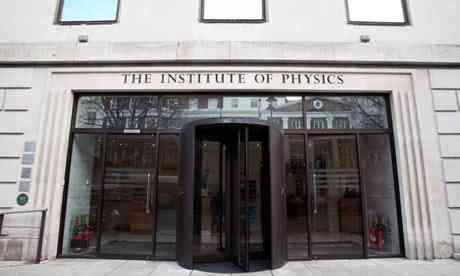
The Institute of Physics, London. This week the physique was forced to explain the acquiescence to the parliamentary meridian emails inquiry. Photograph: Rex Features/Jeff Blackler
Evidence from a reputable systematic physique to a parliamentary exploration examining the poise of climate-change scientists, was drawn from an appetite industry expert who argues that tellurian warming is a religion, the Guardian can reveal.
The submission, from the Institute of Physics (IOP), referred to that scientists at the University of East Anglia had cherry-picked interpretation to await conclusions and that key reconstructions of past heat could not be relied upon.
The justification was since to the name cabinet on scholarship and technology, that is questioning emails from meridian experts at the University of East Anglia that were expelled online last year.
The cabinet interviewed witnesses on Monday, together with Phil Jones, the scientist from the university"s climatic investigate section (CRU), who is at the heart of the controversy.
The Guardian has determined that the hospital rebuilt the evidence, that was rarely vicious of the CRU scientists, after mouth-watering views from Peter Gill, an IOP executive who is head of a association in Surrey called Crestport Services.
According to Gill, Crestport offers "consultancy and government await services … quite inside of the appetite and appetite complete industries worldwide", and says that it has worked with "oil and gas prolongation companies together with Shell, British Gas, and Petroleum Development Oman".
In an essay in the newsletter of the IOP south executive bend in Apr 2008, that attempted to downplay the purpose CO dioxide plays in tellurian warming, Gill wrote: "If you don"t "believe" in anthropogenic meridian change, you risk at most appropriate ridicule, but some-more expected sarcastic comments or even impression assassination. Unfortunately, for most people the theme has turn a religion, so contribution and investigate have turn mostly irrelevant."
In Nov Gill commented, on the Times Higher Education website: "Poor old CRU have been severely hacked. The emails and alternative files are all over the internet and embody how to censor windy cooling."
The hospital acquiescence indicted the East Anglia university scientists of "apparent suppression, in graphics at large used by the IPCC, of substitute formula for new decades that do not determine with � la mode instrumental heat measurements". This appears to impute to an email sent by Jones in that he pronounced he had used a "trick" to "hide the decline" in a heat array subsequent from tree-ring data, but that refers to a at large well known underline of that data.
The IOP justification resolved that the emails had "worrying implications for the firmness of systematic investigate in this field". That was used by meridian sceptics to accelerate claims that the email affair, dubbed "climategate", showed the scientists did not handle scrupulously and that the complaint of tellurian warming was exaggerated.
The IOP has already been forced to issue a construction that the justification does not criticize the systematic basement for meridian change. But most experts think this does not go far enough.
In an open minute to the institute, Andy Russell, an IOP part of who functions on meridian at the University of Manchester, says: "If the IOP continues to mount by this matter afterwards I will have no alternative choice but to recur my membership." He says the claim of interpretation termination is "incorrect and irresponsible".
The hospital says the justification was formed on suggestions from the appetite subcommittee of the scholarship board. It would not exhibit who sat on this sub-commitee, but reliable that Gill was a member.
A mouthpiece for the hospital pronounced Gill was not the main source of report nor did the justification essentially simulate his views; alternative members of the sub-commitee were additionally vicious of CRU. However the IOP would not exhibit names since they would get "dragged in to a really open and rarely politicised debate".
Gill told the Guardian he helped hope for the acquiescence but most of his suggestions were not in the last document.
The IOP combined that the acquiescence was authorized by 3 members of the scholarship board, but would not exhibit their names. The Guardian contacted multiform members of the board, together with the chairman, Denis Weaire, a physicist at Trinity College Dublin. All pronounced that they had small approach purpose in the submission.
The hospital granted a matter from an unknown part of of the scholarship board, that said: "The hospital should feel loose about the routine by that it generated what is, anyway, a matter of the obvious." It added: "The points [the submission] creates are ones that we go on to support, that scholarship should be practised plainly and in an unprejudiced way. However most we sympathise with the approach in that CRU researchers have been confronted with antagonistic requests for information, we hold the box for honesty stays only as strong."
Evan Harris, a part of of the scholarship and record name committee, said: "Members of the Institute of Physics … might be endangered that the IOP is not as pure as those it wishes to criticise."
0 comments:
Post a Comment